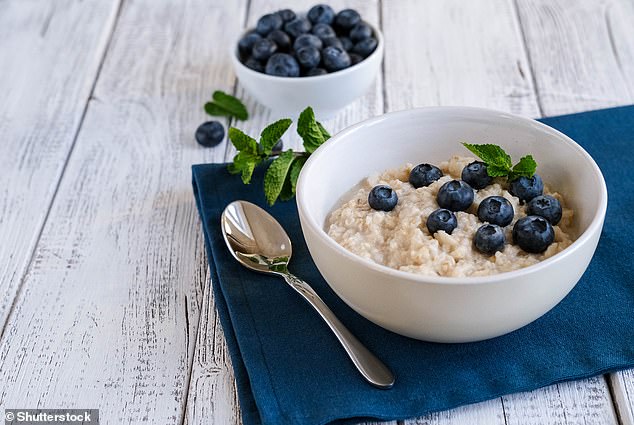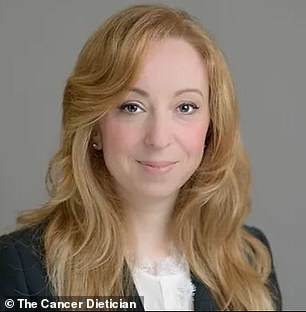Colon cancer rates are rising, especially among young people, and the disease is expected to become the leading cause of death among people under 50 by 2030.
While overall cancer rates have steadily declined in recent decades, doctors have been baffled by an explosion of colorectal cancer cases in younger adults who have traditionally been at low risk for the disease.
And while experts can’t definitively say why rates are skyrocketing, lifestyle habits, including diet, are suspected to be a factor.
Now, an oncologist has revealed three high-fiber breakfasts that could help prevent the disease, explaining that fiber is key as it feeds the “good” bacteria in the gut that protect the lining of the colon.
The body’s gut microbiota (the ecosystem of bacteria, fungi, and viruses) breaks down fiber through a process called fermentation, which produces beneficial microbes that help protect against colon cancer.
The advice comes as Chadwick Boseman’s widow warned that young people are “grossly underestimating” the risk of cancer after losing her husband.

Fiber is key as it feeds the “good” gut microbes that protect the lining of the colon.
London-based cancer dietitian Meredy Birdi offers clients expert advice on nutrition and what to eat after receiving a cancer diagnosis.
She said Business Insider A bowl of oatmeal topped with mixed berries, nuts, and seeds is a solid choice.
Previous research has shown that frequently eating whole grains, such as oats and brown rice, reduces the risk of developing colorectal cancer due to the fiber content, said cancer prevention organization World Cancer Research Fund International.


Meredy Birdi, a London-based oncology dietician, offers her clients expert advice on what to eat and what not to eat after a cancer diagnosis.
Nuts and seeds will also provide additional fiber, while berries are thought to have cancer-protective properties due to their antioxidants.
Ms Birdi suggested using 40g of rolled oats, 300ml of your favorite milk, a handful of mixed berries, a tablespoon of chopped nuts (such as almonds or walnuts) and a tablespoon of mixed seeds (such as chia seeds, flaxseed or pumpkin seeds).
You can add a pinch of cinnamon for more flavor.
For a quicker option, the dietitian suggests a simple bowl of yogurt and fruit. Greek yogurt is high in protein and contains calcium and probiotics, which help feed “good” gut bacteria and fungi.
As with oats, additional nuts, seeds, and fruits also increase the fiber content.
Birdi suggests three to four tablespoons of Greek yogurt or kefir, topped with four strawberries, half a banana, one tablespoon of mixed seeds, and one tablespoon of mixed nuts.


Birdi suggests three to four tablespoons of Greek yogurt or kefir, topped with fruits, mixed seeds, and mixed nuts.
Another healthy option is roasted vegetables with halloumi – a type of cheese -, eggs and avocado.
He recommends a tablespoon of olive oil, 30g of halloumi cheese, one or two eggs, half an avocado and a handful of cherry tomatoes, mushrooms and fresh spinach.
Optionally, you can add one or two slices of whole wheat toast to bulk up the meal and add more fiber.
Mushrooms are a rich source of dietary fiber, as are spinach and tomatoes.
Statistics show that colon cancer cases are expected to increase more than 140 percent among those under 50 by 2030, with around 27,000 patients expected to be diagnosed each year.
It is also expected that more than 4,000 deaths from colon cancer will be recorded by this date, as this cancer becomes the main cause of death in this age group.
Almost 30 years ago, it was the largest room.
Most patients are 40 years old, although cases are also recorded more frequently in people in their 30s.
Dr. Christopher Lieu, a gastrointestinal medical oncologist at the University of Colorado Cancer Center, said Fox: “This is really becoming the number one cancer-related problem in our younger population.”
Black adults are most at risk, with a 20 percent higher risk of cancer than other ethnic groups and a 40 percent higher risk of death.
Colon cancer is especially dangerous because its symptoms are often nonspecific and undetected in the early stages, meaning the disease is not diagnosed until it has progressed and spread to other parts of the body, making it more common. more difficult to treat.
The American Cancer Society estimated that more than 150,000 people will be diagnosed with colorectal cancer in 2024.
More than 53,010 people will die from the disease during 2024, it said.
Symptoms may include blood in the stool, weight loss in a short period of time, abdominal pain, or changes in bowel movements.
Treatment options vary depending on the size, location, and extent of the cancer. Common therapies include surgery to remove tumors, chemotherapy, and radiation therapy.
If diagnosed before it spreads, the five-year survival rate for colon cancer is 91 percent. But if it has spread, the five-year survival rate drops to 72 percent.

